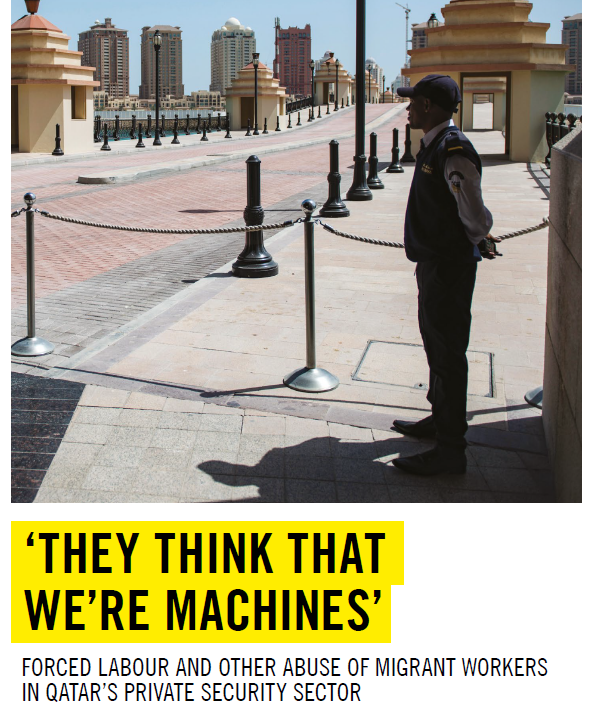Security guards in Qatar are working in conditions which amount to forced labour, including on projects linked to the 2022 FIFA World Cup, Amnesty International has found. In a new report, They think that we’re machines, the organization documented the experiences of 34 current or former employees of eight private security companies in Qatar.
The security guards, all migrant workers, described routinely working 12 hours a day, seven days a week – often for months or even years on end without a day off. Most said their employers refused to respect the weekly rest day which is required by Qatari law, and workers who took their day off anyway faced being punished with arbitrary wage deductions. One man described his first year in Qatar as “survival of the fittest”.
In 2017 Qatar embarked on a promising agenda to tackle labour issues. It has introduced important legal reforms including a new minimum wage and improved access to justice, and repealed key aspects of the abusive kafala system. However, these reforms are not being effectively implemented. What’s more, many of the abuses Amnesty International documented are violations of Qatari laws and regulations predating the reforms.
“The abuses we uncovered can all be traced back to the massive power imbalance that still exists between employers and migrant workers in Qatar, indicating that there are still major gaps in the authorities’ enforcement of labour laws. Many of the security guards we spoke to knew their employers were breaking the law but felt powerless to challenge them. Physically and emotionally exhausted, workers kept reporting for duty under threat of financial penalties – or worse, contract termination or deportation,” said Stephen Cockburn, Amnesty International’s Head of Economic and Social Justice.
“Despite the progress Qatar has made in recent years, our research suggests that abuses in the private security sector – which will be increasingly in demand during the World Cup – remain systematic and structural. Employers are still exploiting their workers in plain sight, and the Qatari authorities must take urgent measures to protect workers and hold abusers accountable.”
Amnesty International is calling on Qatar to urgently investigate abuses in the private security sector, publish its findings, and offer redress for workers, including ensuring they get adequate rest and pay. Qatar should also publish a detailed action plan for effectively tackling forced labour practices in the sector.
READ the REPORT


